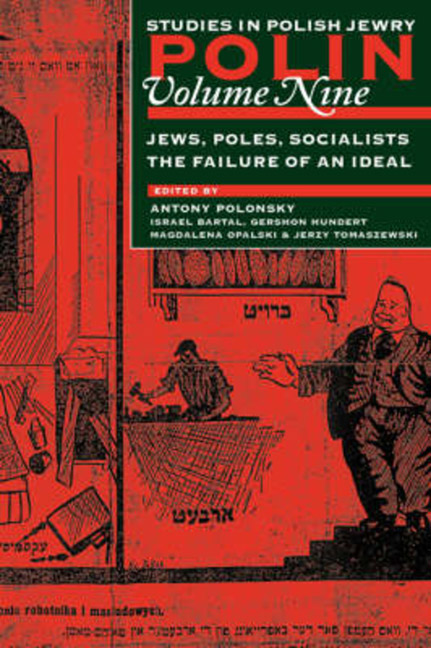Book contents
- Frontmatter
- Dedication
- Editors and Advisers
- Preface
- Acknowledgement
- Polin
- Polin: Studies in Polish Jewry
- Contents
- Note on Transliteration, Names, and Place Names
- Abbreviations
- Introduction
- PART I POLES, JEWS, SOCIALISTS: THE FAILURE OF AN IDEAL
- Jewish Socialists in the Kingdom of Poland
- The Jewish Problem in Polish Socialist Thought
- The Relation of the Polish Socialist Party: Proletariat to the Bund and the Jewish Question, 1900-1906
- The Jews, the Left, and the State Duma Elections in Warsaw in 1912: Selected Sources
- Jews and the Russian Revolution: A Note
- The Bund in Poland, 1935-1939
- Łodź Remained Red: Elections to the City Council of 27 September 1936
- The Jews of Vilna under Soviet Rule, 19 September-28 October 1939
- The Polish Underground and the Extermination of the Jews
- The Jewish Underground and the Polish Underground
- The Pogrom in Kieke on 4July 1946
- Antisemitism in Poland in 1956
- PART II NEW VIEWS
- PART III REVIEWS
- REVIEW ESSAYS
- BOOK REVIEWS
- Bibliography Of Polish-Jewish Studies, 1993
- Notes on Contributors
- Notes on Translators
- Glossary
- Index
Jewish Socialists in the Kingdom of Poland
from PART I - POLES, JEWS, SOCIALISTS: THE FAILURE OF AN IDEAL
- Frontmatter
- Dedication
- Editors and Advisers
- Preface
- Acknowledgement
- Polin
- Polin: Studies in Polish Jewry
- Contents
- Note on Transliteration, Names, and Place Names
- Abbreviations
- Introduction
- PART I POLES, JEWS, SOCIALISTS: THE FAILURE OF AN IDEAL
- Jewish Socialists in the Kingdom of Poland
- The Jewish Problem in Polish Socialist Thought
- The Relation of the Polish Socialist Party: Proletariat to the Bund and the Jewish Question, 1900-1906
- The Jews, the Left, and the State Duma Elections in Warsaw in 1912: Selected Sources
- Jews and the Russian Revolution: A Note
- The Bund in Poland, 1935-1939
- Łodź Remained Red: Elections to the City Council of 27 September 1936
- The Jews of Vilna under Soviet Rule, 19 September-28 October 1939
- The Polish Underground and the Extermination of the Jews
- The Jewish Underground and the Polish Underground
- The Pogrom in Kieke on 4July 1946
- Antisemitism in Poland in 1956
- PART II NEW VIEWS
- PART III REVIEWS
- REVIEW ESSAYS
- BOOK REVIEWS
- Bibliography Of Polish-Jewish Studies, 1993
- Notes on Contributors
- Notes on Translators
- Glossary
- Index
Summary
SOCIALISM at the end of the nineteenth century owed much to the assimilated Jewish intelligentsia. Their presence was noted in all Socialist organizations, parties, spin-offs and factions in the Russian Empire, across the three partitions of Poland, and in Europe. Among the political prisoners sentenced to Siberia by the Tsar between 1878 and 1880, about 4 per cent were Jewish Socialists. They played the leading role in Russian social democracy, and were activists in all the revolutionary organizations of Russia, Lithuania, and Poland. With great fervour they produced underground press material and smuggled it across the border, worked among the Polish, Lithuanian, and Russian workers, and, dressed as peasants, agitated in the villages of the Empire. They were not, however, very interested in the problems of their own group. They saw the emancipation of the Jewish masses as dependent upon the emancipation of the entire proletariat. They perceived the ‘dumb, backward’ Jewish masses much as this group was regarded by assimilation activists, seeing in them solely ‘insignificant gesheftists and profiteers'.
In the Vilna circle of narodniks, the companions of Józef Pilsudski were Aron Zundelewicz, Izaak Kaminer, Aron Samuel Lieberman, Abe Finkelstein, Leon Jogiches, Charles Rapoport, J. Martov-Tsederbaum, Yosif Mill, and Arkady Kremer (subsequently founder of the Bund), as well as Izaak Dembo, who was later implicated in plans to assassinate the Tsar and the Prussian Emperor. It was in Vilna that Zofia Sandberg, sisters Rachel and Fanny Puzyrenski, Ewa Gordon, and sisters Ester and Elzbieta Gordon-later activists in the organization Proletariat-began their activist careers.
Things progressed to the point where a conspiratorial circle was active even in the Vilna Rabbinical School. One of its partisans was Aron Samuel Lieberman (1844-80). The grandson of the rabbi of Łuna (Grodno province) and son of a maskil and Hebrew publicist, in 1874 he began to work in Zundelewicz's group within Narodnaya Volya [The People's Will]. Barely a year later, threatened with prosecution, he escaped across the border. In London he associated himself with Piotr Lavrov's narodnik publication Vperiod [Forward]. Lavrov, in an effort to reconcile revolution with tradition, had discerned threads of Socialism in the beginnings of Christianity as well as in the institution of obshchina, an archaic form oflandownership still maintained among Russian peasants into the nineteenth century.
- Type
- Chapter
- Information
- Jews, Poles, Socialists: The Failure of an Ideal , pp. 3 - 13Publisher: Liverpool University PressPrint publication year: 2008

